The office is about to be transformed, not eliminated

Are we seeing the demise of the office?
Since lockdown measures spurred a working from home revolution in March, many commentators have predicted that this trend is here to stay.
But offices are more than bricks and mortar. They play a vital role in forming the very ethos of a business and help shape the careers and personalities of the people working in them.
Consider how the right office space often provides the best environment for collaboration, team interaction and innovation. Numerous studies have found that firms with a business model reliant on innovation are likely to experience a fall in productivity and revenues with the introduction of large-scale remote working. The tech giant Yahoo famously repatriated its remote working staff to the office several years ago in a bid to address this issue.
Informal, unplanned communication — a chance encounter with a client or a brief conversation over a kettle — would never make it into a video call. Yet these can be some of the most interesting and productive exchanges.
Similarly, the experience (or, at least, the strength) of the mentoring process might be lost without an office environment. This would be detrimental to so many careers. Most professionals remember a business mentor who has inspired them, and I question whether these relationships can be formed and nurtured remotely — they are normally enhanced by the regular familiarity of office life.
The office environment is also vital in promoting a sense of purpose and shared values, helping to foster team spirit. Working remotely undoubtedly limits interaction between different age groups, job roles and seniority. In contrast, an office pulls a team together and people get to know each other on many levels.
These are not controversial views. Businesses have increasingly used high-quality office space — and its location — as a tool to attract and retain staff. Even in these strange circumstances, this is still a hugely important factor, particularly for more junior members of the team.
They often prefer working from an office as their living arrangements tend to be less suited to home working and the office is the place from which they work, socialise, and build personal and commercial networks. And that’s before you even factor the negative impact of remote working on mental health.
This is not the first time we’ve been warned about the end of the office. In fact, it has routinely been predicted — with the advent of email, the internet, and mobile phones, and again with the rise in agile working.
Each time, the office endured. Its role was not diminished. But it did change — in some instances significantly.
So while we should be wary of initial knee-jerk reactions, the pandemic is certainly set to make its mark on our workplaces.
Altered seating arrangements, staggered working times, and changes in how buildings are used and the circulation around them will naturally lead to fewer people in an office at one time. Agile working and desk-sharing policies will be reviewed, and this will significantly reduce the capacity at which buildings operate. This means that offices will have significantly lower occupational densities in the short term.
Ironically, once social distancing measures are lifted, the significance of elements now severely restricted are expected to increase. Office space will likely focus on areas such as team working, meeting face-to-face, training, mentoring, and socialising, as well as for forging a corporate identity and creating a sense of belonging — in other words, all the benefits of working in an office that we have missed during this period.
And while office densities will rise once restrictions are lifted, they are expected to be permanently lower than the pre-coronavirus norm as the role of the workplace changes.
A more rapid and lasting shift towards working from home will accelerate a trend that was already emerging. Employees are now getting used to technology, and companies have been forced to trust their staff to do this. The concept of “presenteeism” now seems outdated, and we will see an increase in personal flexibility around where and when employees work.
We should embrace the reimagining of the office. The availability of a variety of working options, including quiet and more focused environments outside of a busy office — could aid creativity, enabling people to work how and where best suits them.
The current crisis is also driving corporate decision-makers to challenge existing assumptions on how they use their office space, and how much they require — assessing their portfolios and balancing the risks, costs, and benefits of occupying office space. For some businesses, an office will no longer be considered a necessity, but instead a positive choice, with greater emphasis on the quality of the space and amenities available.
Whatever staff and employers decide, working spaces will be forced to adapt because of Covid, just as those who inhabit already have. Still, while they may look very different to what we are used to, the concept of the office is certainly not a thing of the past.
And for those of us who like office life and thrive within it, there is light at the end of the tunnel.
Main image credit: Getty